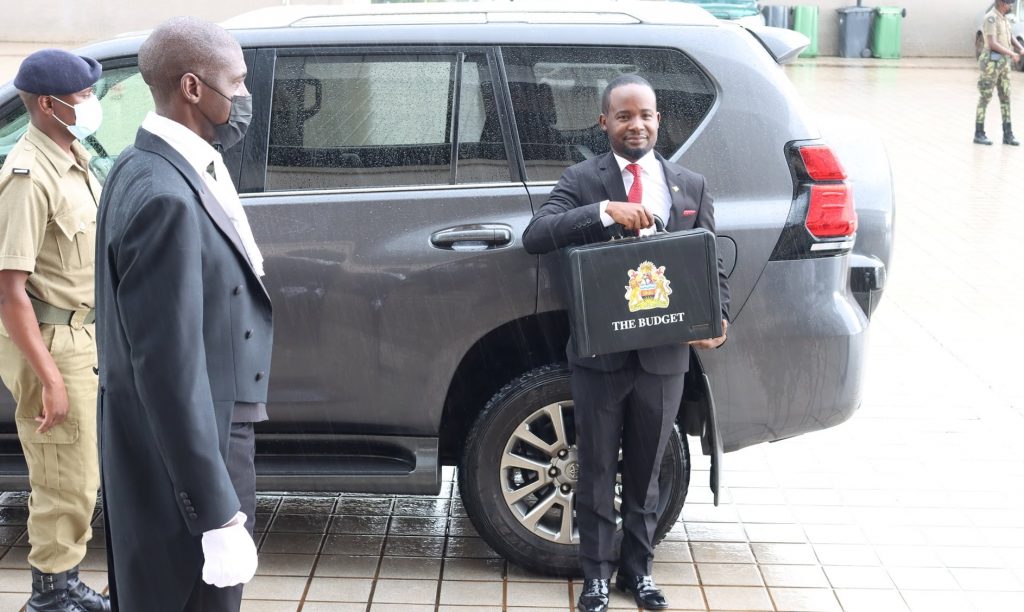Budget highlights low growth, high debt levels
Low growth. High debt levels. Deteriorating fiscal performance. Harsh economic pain.
That is the state of the Malawi economy painted in Parliament yesterday in which, at a projected 4.1 percent this year from 3.3 percent last year, the pace of expansion in gross domestic product (GDP) remains well below the six percent mark needed to have a dent on poverty amid suffocating national debt, disappearing resource envelope and looting of the little money available.

It is the kind of fiscal stress that newly-minted Finance and Economic Affairs Minister Sosten Gwengwe carried in his emblazoned briefcase tabled as Malawi’s K2.84 trillion 2022/2023 National Budget.
Tethered to what Gwengwe called a strict fiscal consolidation policy, the man who replaced Felix Mlusu last month believes that public debt management, export diversification, import substitution and solving the balance of payment riddle could take Malawi out of the ditch that decades of mismanagement, corruption, ill-conceived borrowing and, most recently, Covid-19 and climate change linked disasters shoved it into.
But how that can be achieved in the age of fiscal adjustment, Gwengwe could not elaborate in more detail.
While fiscal adjustment is the common sense strategy for a country panting under the kind of financial and economic crisis Malawi has gone through, Gwengwe provided little clarity on the nature and scope of the fiscal consolidation that, apparently, is the heartbeat of this year’s budget.

For example, despite the pain that fiscal adjustments bring to citizens, Gwengwe did not indicate how long the consolidation would take and what will determine its duration.
Also lacking in detail were devils such as size and intensity of the adjustments and what will determine those.
To be fair, Gwengwe signalled that there would be fiscal retrenchment in such areas as benefits for senior government officials, including the Presidency and Cabinet for possible cuts; the government motor vehicle policy that could reduce the fleet and efficiency gains in areas such as the Affordable Inputs Programme (AIP) by exploring direct procurement from fertiliser manufacturers and cutting the AIP budget
But at a glance these look cosmetic and do not appear to have gone far enough.
Moreover, the depth and breadth of the fiscal retrenchment is muddled as tax measures in this budget seem unable to provide direction in this regard the same way Gwengwe has been at pains to demonstrate cuts in the real level of government spending.
That points to the possibility that government may not have gone too deep into examining the economic environment, political settings as well as the current legal and regulatory framework that are crucial to enabling fiscal consolidation and the debt stabilisation that Gwengwe says is one of the key strategic pillars of his budget.
Already, the deficit is still highly elevated at K884 billion in nominal terms although at 7.7 percent of GDP, Gwengwe says it is better than during the stop-gap financial year that covered the July-March 31 period ahead of the new financial calendar that starts on April1 2022.
Gwengwe, who on several occasions attracted rounds of applause from both sides of the House, said the 2022-23 fiscal plan is aligned to Tonse administration’s three priority areas, namely; wealth creation, job creation and food security as espoused in the Malawi Vision 2063 (MW2063) and its 10-year implementation plan launched last November.
In his 55-page statement, the youthful minister maintained that the allocations in the next national budget have been tallied to the second national development plan which was launched in January last year.
Alarmed by high level of indebtedness which has been another issue of public concern, Gwengwe said public debt management will be at the pinnacle of the implementation of the 2022/2023 budget, describing the same as an elephant in the room.
Said the minister: “Honourable Members may wish to note that my Ministry is currently reviewing our domestic debt profiles with a view of restructuring debt towards longer maturity period, which will address the current debt sustainability concerns.”
The minister said as one of the measures to contain public debt, Capital Hill will maintain a policy of concessional borrowing “preferring grants and only under very exceptional circumstances contract non-concessional loans for high value investments”.
But this policy thrust is not new as that is the same Debt Management Strategy Treasury has pursued post debt relief attained in 2006, only for public debt to head back towarda unsustainable levels standing at more than 54 percent of GDP currently.
The budget tabled yesterday said little of what would be different this time to ensure that Capital Hill sticks to the plan.
But Gwengwe did say government will engage its external creditors to restructure some of the loans.
“My Ministry will intensify efforts to refinance all expensive and near-maturing debt using cheaper debt to create fiscal space. This will enable Government to have resources for financing exports enhancing projects such as in the mining sector”.
The prime focus on debt management comes at a time when Malawi’s debt stock keeps pilling to worrying levels, estimated at K5.5 trillion as at June 2021 from K4.1 trillion in June 2020––which is an increase of K1.4 trillion in just a year.
At K5.5 trillion, the debt stock was an equivalent of 54 percent of the Gross Domestic Product (GDP), almost reaching international and regional threshold of 60 percent of the GDP.
According to Gwengwe, in the newly–unveiled financial plan, interest payments stand at K524 billion representing 4.6 percent–which is an increase from K2.99.7 billion for 2021/22 financial year. The payment in interests alone exceeds even the highest sectoral allocation of K462 billion to education – which is one of the enablers to achieve the MW2063.
Apart from management of debt, the new minister strongly stressed the need to cut down public expenditure.
Against the backdrop of concerns on poor performance characterizing most State-owned enterprises (SOEs), the minister said from this year, he will be presenting financial statements, in the National Assembly, for all public entities.
“Madam Speaker, to enhance monitoring of revenues collected by SOEs, all commercial SOEs will from 2022/2023 financial year open holding accounts with the Reserve Bank of Malawi. This arrangement is expected to help in addressing the challenge of non-remittance of Dividends and Surpluses to Government by SOEs and will also reduce Government borrowing of its own resources.”
The Tonse administration also appears to have succumbed to public pressure to tame the rising cost of living which recently prompted some concerned citizens to mount protests in various parts of the country.
Gwengwe, without mentioning the actual percentage or figure, hinted that there will be an increase in salaries for civil servants once discussions with Civil Servants Trade Union (CSTU) are completed.
The new financial blue print has reduced the allocation to the problem–ridden Affordable Input Program (AIP) to K109 billion from K142 billion in the previous budget.
Gwengwe’s presentation has probably earned him a good name among fellow parliamentarians having responded to their usual need to increase the Constituency Development Fund (CDF) from K40 million to K100 million.
Reacting to the budget framework economist Milward Tobias, who is also director for Centre for Consultancy and Research, dubbed the fiscal plan “as both good and balanced”.
Said Tobias: “It has balanced the interests of ordinary people as well as business of all sizes: small, medium and large scale. The minister has provided a clear thought process about how to turn around the economy. The budget is also aligned to Malawi 2063 first Implementation Plan which is good”.
In an interview after budget presentation at Parliament British High Commissioner David Beer described the budget as both responsive and progressive especially with the focus on public debt management which he said is quite timely.
Beer said: “The Minister said fiscal consolidation and management of balance of payment (BOP) is the way to go and I completely agree. This will help to achieve macroenomic stability, adding he was looking forward to seeing actual figures on the increase of funding towards governance institutions.
While the budget has received all manner of praise, it suffers from a yawning deficit which has swelled from K718billion in the expiring fiscal year to K884 billion – an equivalent of 7.7 percent of the GDP.
According to the minister, the deficit will be financed through foreign borrowing amounting to K230.07 billion and domestic borrowing amounting to K653.98 billion. n
—Additional reporting by Ephraim Munthali.





